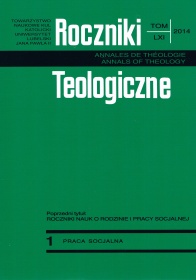Migrant Family in the Social Welfare System
Abstract
The migrant family as a family type has not been often considered eligible for being granted support by welfare institutions due to their stable financial position and the ability to provide relatively satisfactory care to minor children by migrant parents. Nevertheless, the subject literature and research reports explicitly indicate that the situation of migrant families and that of the children raised by them requires a considerable involvement on the part of social services, primarily for prevention purposes, which constitutes a significant aspect of the Polish social policy documents discussed in this article. Further forms of assistance and support to migrant families should be organised within the following structures: schools and other education and care establishments, large-scale social assistance as well as family legislation and the judicial system. It is only the co-operation and complementarity of these components that can assure the effectiveness of compliance with the current needs. The effective operation of the social services and support system is only possible if based on detailed cross-sectional studies enabling a reliable diagnosis of the phenomenon and of the problems that emerge. Therefore, what is an absolute necessity is co-operation accompanied by provision of a coherent support programme to migrant families. Moreover, another requirement for comprehensive support programme is also the necessity to disseminate knowledge on abandoning children by their parents and criminal responsibility that parents face for committing this offence. Unfortunately, the lack of awareness of this responsibility affects adversely the child’s position and that of the parents themselves, who often neglect the procedure of assigning custody of minor children to other people in a situation of the parents’ long-term stay abroad.
References
Bacigalupe G., Cámara M., Transnational Families and Social Technologies: Reassessing Immigration Psychology, “Journal of Ethnic & Migration Studies” 38(2012), nr9, s. 1425-1438.
Benítez J., Salvadoran L., Transnational Families: ICT and Communication Practices in the Network Society, “Journal of Ethnic & Migration Studies” 38(2012), nr9, s. 1439-1449.
Brągiel J., Badory S., Formy opieki, wychowania i wsparcia w reformowanym systemie pomocy społecznej, Opole: Uniwersytet Opolski 2005.
Castańeda E., Buck L., Remittances, Transnational Parenting, and the Children Left Behind: Economic and Psychological Implications, “Latin Americanist” 2011, nr4, s. 85-110.
Danilewicz W., Rodzina ponad granicami. Transnarodowe doświadczenie wspólnoty, Białystok: „Trans Humana” 2010.
Dreby J., Children's Leverage in Mexican Transnational Families. Conference Papers: American Sociological Association. Annual Meeting, Montreal 2006.
Dreby J., Parent-Child Separation in Mexican Transnational Families. Dissertation Abstracts International Section A, “Humanities and Social Sciences” 2008, nr 9-A, s. 4090.
Dyczewski L., Rodzina i jej miejsce w hierarchii wartości młodego pokolenia Europejczyków. Wyniki badań socjologicznych, w: J. Gorbaniuk (red.), Sytuacja rodziny we współczesnym społeczeństwie – doświadczenia Europy Środkowo-Wschodniej, Lublin: Wyd. EL-Press 2007, s. 22-39.
Dziewięcka-Bokun L., Rodzina jako wyzwanie polityki społecznej, w: J. Kędzior, A. Ładyżyński (red.), Współczesne wyzwania pracy socjalnej, Toruń: Wydawnictwo „Adam Marszałek” 2009, s. 69-80.
Gizicka D., Gorbaniuk J., Szyszka K., Rodzina w sytuacji rozłąki migracyjnej, Lublin: Wydawnictwo KUL 2010.
Gorbaniuk J., Rodzina w rozłące migracyjnej, w: M. Zając (red.), Emigracja wyzwaniem duszpasterskim dla Kościoła w Polsce, Lublin: Wydawnictwo KUL 2009, s. 159-170.
Grewiński M., Wyzwania stojące przed instytucjami pomocy społecznej w kontekście realizacji projektów systemowych Programu Operacyjnego Kapitał Ludzki 2007-2013, w: W. Szymczak (red.), Współczesne wyzwania i metody pracy socjalnej, Lublin: Towarzystwo Naukowe KUL 2009, s. 29-53.
Kawczyńska-Butrym Z., Współczesna rodzina – wyzwania dla pracy socjalnej, w: W. Szymczak (red.), Współczesne wyzwania i metody pracy socjalnej, Lublin: Towarzystwo Naukowe KUL 2009, s. 21-28.
King R., Vullnetari J., Orphan Pensioners and Migration Grandparents. The Impact of Mass Migration on Older People in Rural Albania, “Agcing & Society” 2006, nr 5, s. 783-816.
Kozdrowicz E., Rodzina niepełna, w: T. Pilch (red.), Encyklopedia pedagogiczna XXI wieku, t. V, Warszawa: PWN 2006, s. 336-346.
Kozdrowicz E., Walczak B., Wprowadzenie, w: E. Kozdrowicz, B. Walczak (red.), Szkoła wobec mobilności zawodowej rodziców i opiekunów. Niezbędnik nauczyciela, „Zeszyty Metodyczne” 2008, nr 8, s. 5.
Maj B., Współczesna rodzina jako podmiot pracy socjalnej, w: J. Kędzior, A. Ładyżyński (red.), Współczesne wyzwania pracy socjalnej, Toruń: Wydawnictwo „Adam Marszałek” 2009, s. 81-90.
Mituła E., Rodziny pełne nie w pełni – eurosieroctwo. Opieka nad dzieckiem a migracja zarobkowa rodziców, w: A. Ładyżyński (red.), Rodzina we współczesności, Wrocław: ATUT 2009.
Moskal M., Transnationalism and the Role of Family and Children in Intra-European Labour Migration, “European Societies” 2011, nr1, s. 29-50.
Nowak B. M., Rodzina w kryzysie. Studium resocjalizacyjne, Warszawa: Wydawnictwo Naukowe PWN 2012.
Pantea M. C., “I Have a Child and a Garden”: Young People's Experiences of Care Giving in Transnational Families, “Journal of Youth Studies” 2012, nr2, s.241-256.
Rymsza M., W stronę pracy środowiskowej i nowych ról zawodowych pracowników socjalnych, w: M. Rymsza (red.), Pracownicy socjalni i praca socjalna w Polsce. Między służbą społeczną a urzędem, Warszawa: Instytut Spraw Socjalnych 2012, s. 203-226.
Slany K., Co to znaczy być migrantką?, w: K. Slany (red.), Migracje kobiet. Perspektywa wielowymiarowa, Kraków: Wydawnictwo UJ 2008, s.7-30.
Tomaszewska H., Diagnoza rodzinnej i szkolnej sytuacji dziecka z rodziny migracyjnej, w: E. Kozdrowicz, B. Walczak (red.), Szkoła wobec mobilności zawodowej rodziców i opiekunów. Niezbędnik nauczyciela, „Zeszyty Metodyczne” 2008, nr 8, s. 37-53.
Weissbrot-Koziarska A., Poradnictwo socjalne dla rodzin. Podręcznik akademicki, Opole: Uniwersytet Opolski 2012.
Yeleyko I., Specyfika migracji zarobkowej ludności na Ukrainie, w: M.G. Woźniak (red.), Gospodarka oparta na wiedzy, Rzeszów: UR KTE 2007, s.401-410.
Zielińska A., Pedagogiczno-prawne aspekty opieki nad dzieckiem w sytuacji wyjazdu rodziców do pracy za granicę, „Pedagogika Społeczna” 2008, nr3, s.47-60.
Copyright (c) 2014 Roczniki Teologiczne

This work is licensed under a Creative Commons Attribution-NonCommercial-NoDerivatives 4.0 International License.





